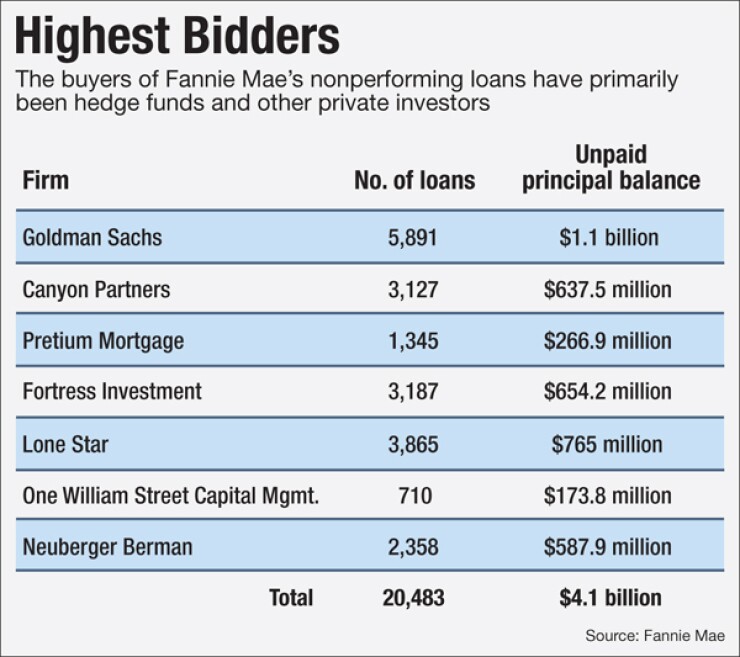
Housing advocates are criticizing Fannie Mae's and Freddie Mac's practice of selling nonperforming loans to the highest bidders, typically well-capitalized investment firms and hedge funds.
A coalition of community and housing groups wants the Federal Housing Finance Agency, which oversees Fannie Mae and Freddie Mac, to instead give preferential treatment to nonprofits and community development financial institutions. They contend that some private buyers do not have a mission of offering foreclosure prevention and homeowner assistance and are not committed to stabilizing communities.
-
WASHINGTON Key Democratic lawmakers are urging the Department of Housing and Urban Development to tighten its program for selling nonperforming guaranteed loans to ensure servicers have exhausted all loss mitigation options before the loans are sold to private investors.
February 1 -
A program that moves distressed mortgages out of the foreclosure pipeline can save the FHA and GSEs money and give troubled borrowers a better shot at staying in their homes but only if it's properly implemented.
September 24
"We do not want our housing and struggling homeowners put in the hands of Wall Street speculators," said Amy Schur, a statewide campaign director at the Alliance of Californians for Community Empowerment, a Los Angeles community organization. "We think it's insane that agencies like Fannie Mae are selling off troubled mortgages at a discount to the likes of Goldman Sachs."
Goldman declined to comment, but Fannie officials strongly defended the loan sales. They argue that selling delinquent loans to the highest bidder reduces losses to taxpayers. Since it is also selling loans at a discount, these buyers also may be able to offer more help to delinquent borrowers, get them to pay their mortgage or ultimately sell the home as housing prices recover.
Since last year, Fannie has sold big pools of severely delinquent loans to private investors, including the giant New York hedge fund Fortress Investment Group, the Dallas private equity firm Lone Star Funds and the New York investment manager Neuberger Berman. Fannie has sold roughly 20,400 loans with $4.1 billion in unpaid balances. Freddie Mac has sold 27,416 loans totaling $5.4 billion in unpaid balances.
Many of those pools will include loans on properties that ultimately are of little interest to investors. Sarah Edelman, the director of housing policy at the Center for American Progress, said there should be standards for dealing with these low-value homes, many of which could wind up sitting vacant for extended stretches of time.
"A vacant property that is sitting and not maintained poses the greatest risk for neighboring homeowners and that market," Edelman said. "It's important that any buyer of a nonperforming loan be held to the same standards that Fannie and Freddie have for the properties."
Julia Gordon, an executive vice president at the National Community Stabilization Trust, has asked the FHFA to reconsider whether vacant or low-value homes should be included in bulk auctions at all. Investors are unlikely to give such properties individual attention, which leads to neighborhood blight, she said. Buyers also should not be permitted to release liens unilaterally and walk away from responsibility for the properties, Gordon said.
Though handling distressed assets is "extremely specialized, daunting and often noneconomic," Gordon said, some borrowers can be helped, to the benefit of both them and the investors.
"Many of these loans were poorly serviced but the buyers can still squeeze a lot of juice out because there are homes that can be saved and some homeowner who did not receive appropriate loss mitigation," Gordon said. "These buyers know they can find enough of the work that was undone to make some money since they're buying at a discount."
Housing groups have met with the FHFA Director Mel Watt and with Ed Golding, the Federal Housing Administration's deputy principal assistant, urging changes such as requiring that buyers meet specific outcomes that better support homeowners and neighborhoods.
Last year, the FHFA
For its part, Fannie said that the auctions have the dual benefit of helping homeowners and reducing potential losses to taxpayers.
"We are committed to reducing Fannie Mae's holdings of nonperforming loans in a responsible way," Joy Cianci, Fannie's senior vice president for credit portfolio management, said in a press release announcing the most recent auction. "We continue to work with struggling homeowners to prevent foreclosures whenever we can. This sale of seriously delinquent loans can create additional opportunities for borrowers to avoid foreclosure while reducing the impact of these loans for Fannie Mae and the taxpayers."
Separately, nonprofits and community groups have their own bidding process for loans in hard-hit areas. Fannie has so far offered two batches of loans known as "community impact pools" to nonprofits, smaller investors, community groups and minority- and women-owned businesses. But the pools are small — 75 nonperforming loans in Tampa, Fla., with $11 million in unpaid principal and 60 loans in Miami with $14.5 million in unpaid principal.
James Sherrill, the chief investment officer at MountainView Management Company, a Denver asset manager, said plenty of firms that have bought distressed loans in recent years have been struggling to hit their return targets. Most investors try to get a loan to perform through a modification, but helping borrowers is not a high priority.
"The people that are up in arms about selling to trading firms are probably right: There are not as many modifications coming out of these [sales] as liquidations," Sherrill said.
Earlier this month,
HUD has sold more than 100,000 nonperforming FHA-insured loans since the agency launched its Distressed Asset Stabilization Program in 2010.





